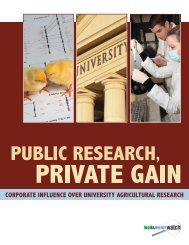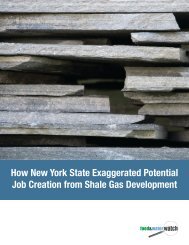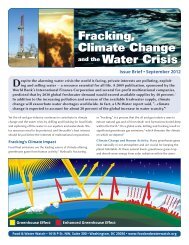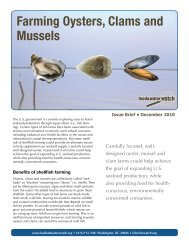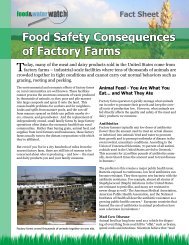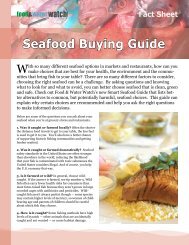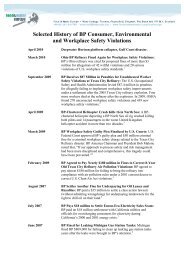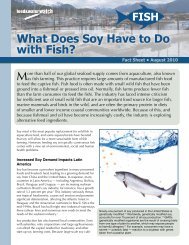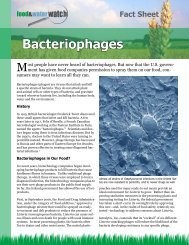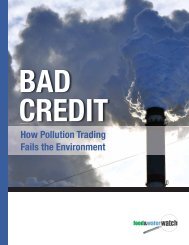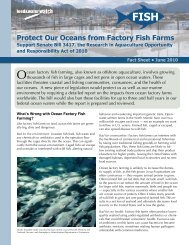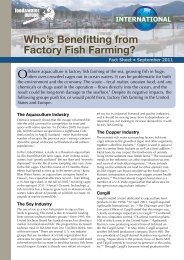Monsanto - Food & Water Watch
Monsanto - Food & Water Watch
Monsanto - Food & Water Watch
Create successful ePaper yourself
Turn your PDF publications into a flip-book with our unique Google optimized e-Paper software.
With this connection to land-grant research, <strong>Monsanto</strong><br />
is not only gaining access to research that is publicly<br />
accepted as legitimate and independent, but it is profiting<br />
highly from it. The company’s signature products,<br />
the artificial growth hormone for cows rBGH and<br />
Roundup Ready seed technology, were only possible<br />
through research provided by public universities. 153 The<br />
use of these technologies is further advanced because<br />
the official agricultural research establishment pursues<br />
them rather than alternatives such as organic or agroecological<br />
solutions. Extension services then spread this<br />
as official advice for best farming practices, giving it<br />
even more legitimacy.<br />
Global Reach<br />
As <strong>Monsanto</strong>’s share of the U.S. market grows, so does<br />
its share of the global market. <strong>Monsanto</strong> has recently<br />
bought multiple companies in South America and Eastern<br />
Europe 154 and licenses and sells its products to every<br />
region in the world. 155 <strong>Monsanto</strong>’s hybrid corn crops hold<br />
the number one position in the share of seeds in all Latin<br />
American “key countries” (Argentina, Brazil and Mexico,<br />
according to a corporate presentation). 156 Approximately<br />
46 percent of <strong>Monsanto</strong>’s 2011 sales originated outside<br />
the United States. 157<br />
Amid discussions of a global food crisis, technological<br />
advancements in biotechnology are widely touted as a<br />
quick, easy and sustainable fix for agricultural development.<br />
Corporations are stepping in as key players in the<br />
fight against hunger and poverty, and they are convincing<br />
governments to let them promote their industrialized<br />
business models in developing countries.<br />
WikiLeaks cables from around the world in recent years<br />
reveal <strong>Monsanto</strong>’s representatives and U.S. government<br />
officials striving to promote and sell biotechnology worldwide.<br />
158 The Department of State has hosted meetings to<br />
discuss the merits of GE technology in target countries in<br />
recent years. 159 Cables from embassies in China, Hungary,<br />
Ukraine, France and even the Vatican show a relentless<br />
drive to convince those countries of the benefits of GE<br />
crops, whether or not the countries themselves want or<br />
need it. 160<br />
Not surprisingly, not all countries are benefiting from<br />
<strong>Monsanto</strong>’s invasive global business strategy. Once<br />
<strong>Monsanto</strong>’s products are introduced, it is virtually impossible<br />
to revert back to traditionally grown crops. Farmers<br />
must invest in the matching herbicide and pesticides, sign<br />
licensing agreements and become liable for any natural<br />
spreading of the germplasm. A few stories from around<br />
the globe illustrate <strong>Monsanto</strong>’s impact.<br />
<strong>Monsanto</strong> 15




